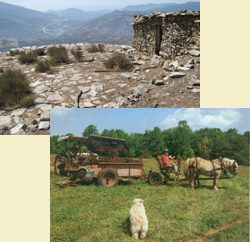Core Ideas
Visioning County Food Production – Part Three
Monday, March 8th, 2010
Seeing County Food Production as an Integrated Whole
In Part One of this series, I proposed principles of agroecosystem design for growers to follow if agriculture is to approach sustainability in a future of declining access to the cheap energy and other inputs on which our industrialized food system relies. I said that providing [...]
Visioning County Food Production – Part Two
Monday, February 15th, 2010General Problem Areas in Sustainable Agricultural Design
In Part One of this series, I noted that providing for the local food needs of urban populations requires a design that integrates three overlapping categories of production systems: urban agriculture systems (many small islands of gardening in the city center), peri-urban agriculture (larger production areas on the immediate [...]
Visioning County Food Production – Part One
Sunday, February 14th, 2010Visioning County Food Production
by Karl North
“Because energies and monies for research, development, and thinking are abundant only during growth and not during energy leveling or decline, there is a great danger that means for developing the steady state will not be ready when they are needed, which may be no more than 5 years away [...]
Introduction to Systems Thinking
Thursday, January 21st, 2010A New Understanding of Root Cause—
Systems Thinking for Problem Solvers
By Karl North
“We’ll never be able to go back again to the way we used to think.” – anonymous holist
A Revolution in the Making
The insight that the world functions in complex, interdependent wholes drives a growing revolution in the way people are examining, understanding, [...]
Two Folktales for Comprehending Late Stage Capitalism and its Scientific Culture
Sunday, January 17th, 2010Karl North 2006
Folktales distill the wisdom of the ages. All too often their teachings are applicable to any era. Perhaps their continuing relevance comes, as the saying goes, from the human propensity to repeat history, once as tragedy, again as farce.
My favorite tales to explain the hilarious but tragic human behavior patterns of late stage [...]
